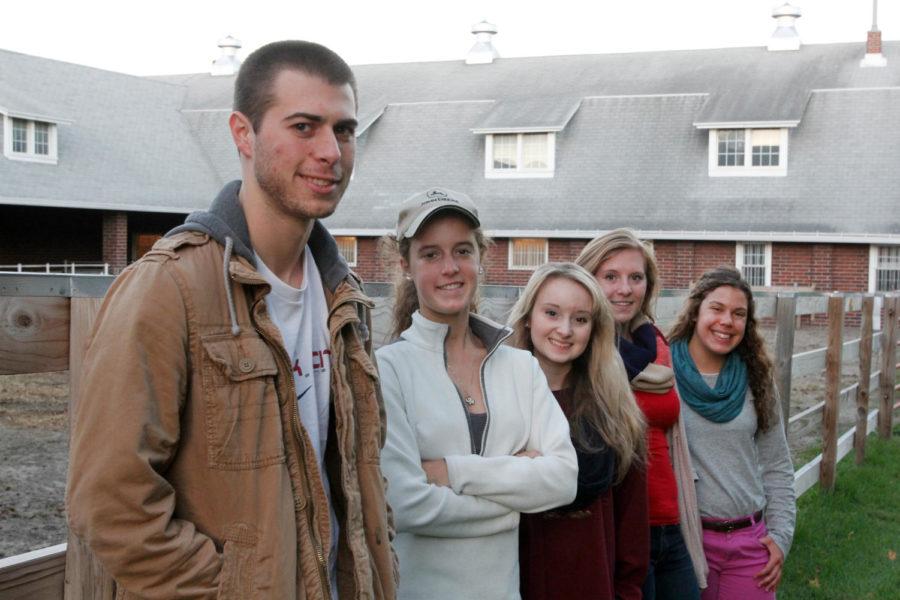Veterinarians Without Borders aims to help animals globally
Kyle Schlichting/Iowa State Daily
From left to right, Neil Vezeau, junior in animal science, Emily Schwake, sophomore in animal science, Elizabeth Bartlett, freshman in animal ecology, Macenzie Johnson, sophomore in animal science and Chelsea Pilipiszyn, freshman in animal science, are members of the newly formed Vets Without Borders club at Iowa State. The club, which is still going through the process of becoming official, will focus on improving community health through agriculture and animal science. Vets Without Borders will look to work with One Health, which unites human and veterinary medicine, during future school breaks in areas like Africa and South America.
October 15, 2014
A new club on campus is forming for people who want to help animals all over the world called Veterinarians Without Borders.
Veterinarians Without Borders is a club that gives students interested in veterinary sciences the necessary skills to travel to less developed countries and do things such as neuter and spay feral animals and keep livestock healthy.
“Veterinarians Without Borders draws attention to different opportunities in veterinary medicine that may not be known otherwise,” said senior Neil Vezeau.
Veterinarians Without Borders aims to inform students of lesser-known opportunities in the veterinary field, prepare them for the “real world” and help develop worldwide animal agriculture.
The club plans to launch in the near future, Vezeau, the chapter founder, submitted the constitution for the club to the Government of the Student Body on Oct. 6.
Veterinarians Without Borders plans to go on one trip abroad each year, and hopes to start traveling as soon as the funds and necessary resources are available. Unfortunately, they may not be available for a couple more years.
The club is overseen by advisers Mike Rentz, lecturer for natural resource ecology and management, and Jennifer Bundy, lecturer in animal science.
“This is a great chance to get involved,” Bundy said.
Bundy said the secondary goal of the club is global animal health because many diseases are zoonotic, meaning they can actually be spread between humans and animals. Prominent zoonotic disease include AIDS, ebola and malaria.
Keeping animals healthy is an effective way to keep humans healthy, she said.
”We’re all in this together, all of humanity, all of the entire planet,” Rentz said. “The health of animals affects us politically, economically, socially and in our health.”
Global animal health is important because many people, especially in less developed countries, rely on animals such as goats and cattle for their own livelihood.
Students who are not pre-veterinary majors can join the club, but having some background in animal sciences may be useful.
Veterinarians Without Borders was originally slated to be a part of the pre-veterinary program, but was made separate due to high interest in the club. Rentz estimated that the majority of the program will be made up of undergrad pre-veterinary students, due to interest and availability of the students.
“[Veterinarians Without Borders] is open to anyone who is interested,” Vezeau said.
Iowa State is not the only school to offer a Veterinarians Without Borders club. Texas A&M also has a chapter.

















